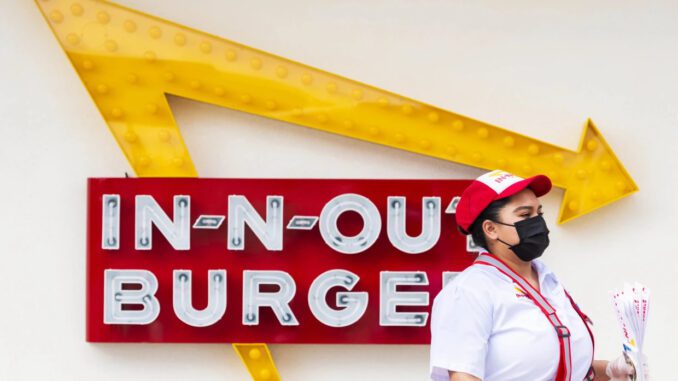
Estimated reading time: 7 minutes
Amid the ongoing COVID-19 pandemic, In-N-Out Burger, the popular fast food chain, is preparing to institute new rules prohibiting workers from wearing masks in five out of the seven states where it operates.
The ban will apply to In-N-Out locations in Arizona, Colorado, Nevada, Utah, and Texas. Workers at In-N-Out locations in California and Oregon, “blue” states that have tended to adopt marginally better, but still woefully inadequate, policies in response to the pandemic, will still be allowed to mask.
The company has threatened workers who do not comply with the ban, who attempt to keep themselves and others safe by wearing masks, with disciplinary measures, “up to and including termination of employment.”
In-N-Out announced the rule in an internal memo circulated to its employees, whom the company euphemistically calls “associates.” The change in policy came to light when the memo was leaked on Twitter.
The memo states that an exception will be made for workers “who have a specific medical condition or other health concern that requires them to wear a mask,” but that such workers “must provide a valid medical note” to store management.
Evidently the company does not believe that the ongoing COVID-19 pandemic, which is still claiming hundreds of lives every day in the U.S., constitutes a “health concern” in itself. The company also disregards the fact that six in ten people in the U.S. have underlying health conditions that increase risk of severe COVID-19 complications.
No, the company places the onus on its workers to prove that they deserve the right to a safe workplace.
The memo is nothing new for In-N-Out. The company has been forced to close multiple locations during the pandemic due to non-compliance with COVID-19 ordinances. It has also resolutely refused to enforce vaccine mandates. The bosses have proven time and time again that they will gladly sacrifice their workers upon the altar of profit.
As infectious disease expert Dr. Judy Stone points out in a recent article in Forbes, “requiring proof of a disability might be considered a violation of the Americans with Disability Act.” Getting a doctor’s note is also onerous for many workers, due to the singularly astronomical costs of health insurance and care in the U.S., the difficulty of even scheduling an appointment, and the loss of wages incurred by taking time off work. Moreover, although the internal memo promises that employees requesting an exemption to the ban are not required to disclose “confidential medical information,” the company still requires that “the medical note should clearly state the reason for the exemption” — an absurd contradiction in terms, and a gross violation of health information privacy law.
Face masks are a basic component of personal protective equipment (PPE), and their use has proliferated during the ongoing COVID-19 pandemic. As Dr. Stone notes, In-N-Out’s policy directly contravenes official guidelines of the Centers for Disease Control and Prevention, which advise that everyone should have the right to wear a mask in public.
How does In-N-Out justify its policy of reckless endangerment, its blatant disregard for its workers’ lives?
According to the memo, the purpose of the new face mask ban is to force workers to “show their smiles and other facial features.” (Ah, of course! Nothing brings a smile like the risk of illness, disablement, and death!) But then the company, leaning a bit too much on euphemism, tips its hand: the face mask ban, continues the memo, will “promote clear and effective communication” between workers, management, and customers, with the aim of creating “customer-centric” restaurants.
The true purpose of the ban is transparently to enforce labor discipline and to appease the section of reactionary consumers who believe that restaurant and other service workers should serve them with a smile — even in the midst of a deadly pandemic.
The capitalist is driven by the profit motive, and by that motive alone. He buys the worker’s time, hour by hour, and for every hour’s wage he pays, he intends to squeeze the worker’s body to the last drop of productivity. And so he demands discipline, and he will use both carrot and stick — more often the latter, when dealing with unskilled, poor and low-wage, and easily replaceable workers — to get it. He demands that the worker never pause a moment to rest; he strictly curtails talk between employees; he waits like a hound to snap and bark at the first sign of idleness. He deplores that he must rent human beings, who tire; who need to break for food and water at regular intervals; who must pause to use the restroom, or to catch their breath between tasks, or to wash their hands. He institutes a regime meant to fashion human workers into machines, and he employs a team of managers to fit the workers to his mechanical designs.
That is why something as mundane and inoffensive as a mask, meant to keep the worker safe, is unconscionable to the capitalist: It hides one of the worker’s “parts” — her mouth — and therefore disrupts “clear and effective communication.” The hypothetical seconds the mask-wearing worker might spend repeating herself are, from the capitalist’s perspective, precious seconds that she could otherwise spend selling another burger to another customer — and he will not abide even a second of lost profit. Moreover, the worker who protects herself, her co-workers, the customers, her family, etc. from illness, who tends to her human needs and her human rights to health and safety, who reclaims even a thin cloth mask’s worth of agency and bodily autonomy, shatters the capitalist’s fantasies of tireless waged machines, humanizing not only the worker, but also her work, her part in the process of production — and that cannot be allowed.
The capitalist is a monster, no doubt, but an impossibly fragile monster — a monster who shudders with grave offense when faced with a bit of unprofitable cloth.
In-N-Out is brazenly violating its employees’ legal rights. It is forcing the workers to subject themselves to the perils of a debilitating and often deadly illness, amid an ongoing pandemic. That much is indisputable.
What does this prove? Only this universal fact of wage-labor: When the workers are disorganized, when we fail to combine in unions and take collective action, we are too weak to assert our rights in the only language the bosses understand — brute force. Only by inspiring fear in our exploiters with the constant threat of strikes and shut-downs can we secure and reaffirm our safety, dignity, and livelihoods.

